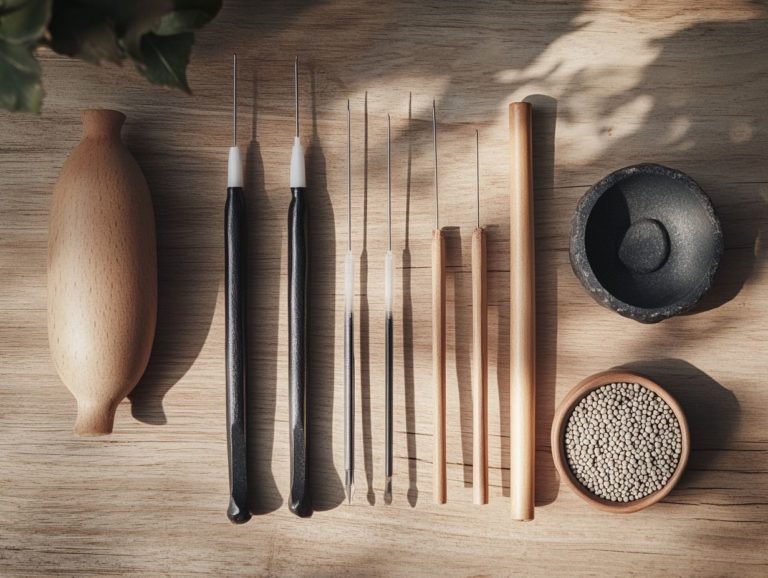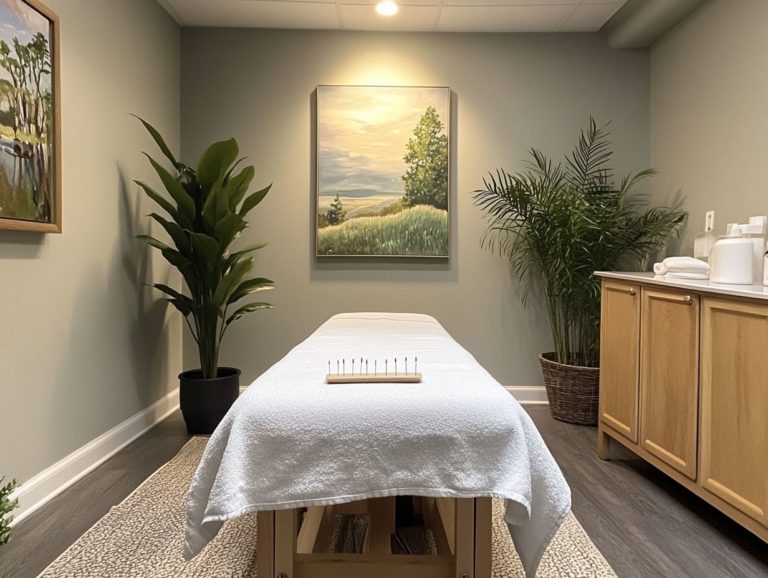The Benefits of Regular Acupuncture Treatments
Acupuncture, an ancient practice deeply embedded in Traditional Chinese Medicine, has emerged as a favored choice for those seeking a holistic approach to health and wellness.
By delving into its rich history and the foundational principles that underscore it, you can gain a deeper appreciation for its evolving significance in both Eastern and Western medical frameworks.
This article will guide you through the mechanics of acupuncture, unveil its extensive benefits for both physical and mental health, and provide insights on selecting a qualified practitioner and preparing for your first session.
Dive into how regular acupuncture treatments can transform your health journey!
Contents
Key Takeaways:

Regular acupuncture treatments can provide both physical and mental health benefits, making it a valuable holistic therapy. Acupuncture works by stimulating the body’s natural healing processes and can be viewed through both traditional Chinese medicine and Western medicine perspectives. When choosing an acupuncturist, it is important to consider factors such as their qualifications, experience, and specialization to ensure the best treatment possible.
Understanding Acupuncture
Understanding acupuncture invites you to delve into its rich heritage within traditional Chinese medicine, which emphasizes the balance of vital energy (qi) flowing through the body.
This time-honored practice revolves around the precise insertion of needles at designated acupuncture points, aimed at fostering healing and restoring the body s natural equilibrium. Acupuncture seeks to address a spectrum of health concerns, ranging from chronic pain relief to stress reduction, and is renowned for its myriad wellness benefits.
As acupuncture therapy gains traction, contemporary insights continue to illuminate its effectiveness in pain management and the enhancement of overall health.
History and Principles
Acupuncture is an ancient practice that has gracefully evolved over thousands of years, rooted in the principles of life energy (qi) flow and the pathways in your body.
These fundamental concepts suggest that life energy travels through specific pathways known as meridians, which are connected to different organs and bodily functions.
By skillfully inserting fine needles at precise points along these channels, practitioners aim to restore balance and harmony within you, addressing a variety of health concerns like pain management, stress relief, and digestive issues.
The cultural significance of acupuncture goes beyond simple treatment; it represents a holistic approach to wellness, embodying a profound understanding of how bodily systems, emotions, and environmental factors are interconnected. This philosophy continues to resonate with those like you who are seeking alternative and complementary therapeutic practices across the globe.
How Acupuncture Works
Acupuncture functions by stimulating specific points along energy pathways in your body, promoting healing and restoring balance.
This process also triggers endorphins, enhancing the treatment’s effectiveness for a range of health conditions.
Traditional Chinese Medicine Perspective
From the perspective of traditional Chinese medicine, you ll find that acupuncture serves as a means to restore balance to the flow of life energy (qi) through the body s meridians, promoting holistic healing.
This practice, steeped in centuries of wisdom, highlights that when life energy flows unimpeded, your body can operate at its best. Any blockages or imbalances can manifest as a range of health issues, from chronic pain and stress to emotional disturbances.
By strategically placing needles at specific acupoints along these meridians, acupuncture facilitates the smooth movement of energy, alleviating symptoms and cultivating a deeper sense of well-being.
As a result, you may experience reduced tension, improved circulation, and enhanced overall vitality, illustrating the remarkable effectiveness of this ancient practice in tackling modern health challenges.
Don’t miss out on experiencing the benefits of acupuncture!
Western Medicine Perspective

From a Western medicine perspective, you ll find that acupuncture is increasingly recognized for its healing mechanisms, particularly in pain management and stress reduction, often backed by scientific research.
Numerous studies have shown its effectiveness, revealing significant reductions in chronic pain levels among patients. This ancient practice is steadily making its way into modern healthcare settings, where it serves as an additional treatment to conventional therapies.
Researchers have pinpointed several therapeutic mechanisms that resonate with Western medical principles, such as the release of endorphins and the modulation of the nervous system. Meanwhile, traditional views emphasize the flow of ‘Qi’, or the energy flow in the body, focusing on holistic balance.
This convergence of ideas demonstrates how acupuncture can act as a bridge between Eastern and Western practices, providing comprehensive benefits for those seeking relief from pain and a heightened sense of well-being. Discover how acupuncture can transform your health today!
Benefits of Regular Acupuncture Treatments
Regular acupuncture treatments provide you with a wealth of health benefits, elevating both your physical and mental well-being as you embark on your wellness journey.
Physical Health Benefits
Acupuncture offers remarkable physical health benefits, especially when it comes to easing chronic pain and enhancing your immune system.
It also provides relief from fatigue and nausea. By targeting specific points on the body, this ancient practice can effectively alleviate conditions such as back pain and migraines, often yielding more enduring results than conventional treatment methods.
If you’re dealing with digestive issues like irritable bowel syndrome, you may find that acupuncture restores balance and improves digestive function.
Thanks to its ability to promote overall well-being, many practitioners advocate for acupuncture as an additional treatment, particularly for those facing chronic conditions that traditional medicine may struggle to manage. This holistic approach can significantly enhance your quality of life, making it a compelling option to consider.
Mental Health Benefits
Regarding mental health benefits, acupuncture can be a game-changer, effectively reducing anxiety symptoms and improving insomnia.
It fosters emotional balance through its relaxation techniques. Numerous studies highlight how acupuncture stimulates the release of neurotransmitters like endorphins and serotonin key players in mood regulation.
If you’re dealing with anxiety, this ancient practice can offer you tangible relief by promoting a profound sense of calm.
Research shows that individuals facing insomnia have experienced significant improvements in sleep quality after committing to regular acupuncture sessions.
Patients often share testimonials about finding not just temporary relief but a deeper sense of emotional stability and overall well-being.
It s evident that acupuncture provides a holistic approach to mental health, making it a valuable option for anyone seeking alternative therapies.
Choosing an Acupuncturist
When selecting an acupuncturist, take a moment to find the right fit. Ensure they are certified practitioners who have received training from accredited acupuncture schools.
Consider their approach to patient care, as this can significantly impact your overall experience and well-being.
Factors to Consider

It s crucial to weigh factors like their experience, specialties, and knack for building a strong rapport with patients. The qualifications and clinical experience of the practitioner significantly influence the quality of care you will receive.
An acupuncturist boasting years of practice in specific areas, such as pain management or fertility, can provide valuable insights that enhance the effectiveness of your treatment.
Open communication is essential; a skilled practitioner should be eager to listen and address any concerns you may have. You re encouraged to ask questions about treatment methods, expected outcomes, and the overall process, ensuring you feel comfortable and well-informed throughout your healing journey.
Preparing for an Acupuncture Session
Preparing for your acupuncture session means familiarizing yourself with what to expect during the treatment. This includes understanding the needle insertion process and the relaxation techniques that enhance your experience.
What to Expect and How to Prepare
During an acupuncture session, you can look forward to a detailed discussion that sets the stage for gentle needle insertion at specific acupuncture points, all aimed at enhancing your comfort. This initial evaluation allows the practitioner to explore your health concerns, preferences, and any previous experiences you may have had with acupuncture.
Once you both feel at ease, the practitioner thoughtfully selects the appropriate points, using traditional techniques tailored to your unique needs. The actual needle insertion process is typically swift and nearly painless, inviting a relaxed state as the treatment unfolds.
Get ready to enjoy a calming 30 to 60-minute session in a tranquil environment. After the treatment, communication remains crucial. The practitioner will provide guidance on post-treatment care and any necessary follow-up, ensuring you leave feeling informed and supported along your journey.
Frequency and Duration of Acupuncture Treatments
The frequency and duration of acupuncture treatments can vary greatly depending on your individual needs and health concerns, as well as the personalized treatment plans designed to enhance your healing journey.
Recommended Treatment Plans
Recommended treatment plans for acupuncture usually take an individualized approach, considering the frequency of your sessions based on your health goals and specific conditions.
These plans address a variety of concerns, from chronic pain to stress reduction and overall mental wellness. If you re dealing with persistent back pain, for instance, you might need a more concentrated schedule of treatments.
If anxiety is your primary issue, less frequent but consistent sessions might be just what you need to enhance your emotional balance. Collaborating closely with a qualified acupuncturist allows you to fine-tune these plans, making sure they fit seamlessly into your personal health journey and lifestyle demands.
This approach paves the way for a more holistic path to recovery and well-being.
Frequently Asked Questions
What are the benefits of regular acupuncture treatments?
Absolutely! Regular acupuncture treatments can provide various benefits to both physical and mental well-being, including pain relief, improved sleep, stress reduction, increased energy levels, and enhanced immune function.
How does acupuncture relieve pain?
Acupuncture works by stimulating specific spots on your body, known as acupoints, which helps to release endorphins the body’s natural painkillers. It also improves blood flow and reduces inflammation, providing significant relief from pain.
Can acupuncture help with mental health?
Absolutely! Acupuncture can effectively address mental health issues like stress, anxiety, depression, and insomnia. By promoting relaxation and balancing the body’s energy, acupuncture can help alleviate mental and emotional symptoms.
How often should I receive acupuncture treatments?
The frequency of acupuncture treatments can vary depending on individual needs and conditions. For acute issues, more frequent treatments may be recommended, while chronic conditions might call for weekly or bi-weekly sessions. Your acupuncturist will work with you to determine the best treatment plan for your specific needs.
Are there any side effects of regular acupuncture treatments?
Generally, acupuncture is a safe and well-tolerated treatment with minimal side effects. Some individuals may experience slight bruising or soreness at the insertion points, but these usually subside quickly. It is essential to consult with a licensed and experienced acupuncturist to minimize any potential risks.
Can acupuncture be used for preventive care?
Yes, acupuncture can serve as a form of preventive care to maintain overall health and well-being. By addressing imbalances in the body’s energy, acupuncture helps prevent illnesses and promotes optimal health. Regular treatments can also assist in managing stress and improving overall quality of life.







